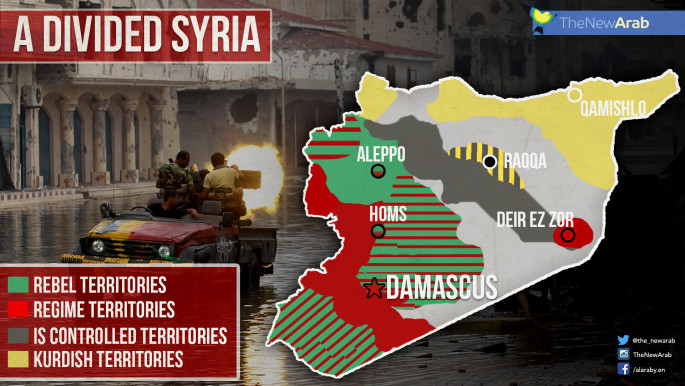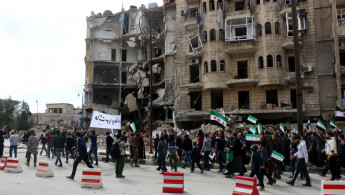'Curse your soul, Jolani': The inner-struggle of Syria's opposition
Since then, something remarkable has happened as the relatively peaceful streets of rebel towns have erupted into carnivals of joy and colour. Hundreds of anti-regime demonstrations have taken place in Syrian opposition towns over the past week after a five year hiatus.
One of the most surprising twists to this tale has been how the Syrian population have remained largely "unradicalised", despite nothing more than superficial support from democratic powers.
Popular songs have even take aim at the jihadi fighters in the neighbourhood.
[The revolution] was hijacked by the bearded men,
Curse your soul Jolani [Nusra leader] and your soul Hassoon [pro-regime Sunni cleric],
Curse your soul Baghdadi [IS leader] wherever you are too!
This combined with the fact that, in many areas, Islamist fighters such as the Nusra Front - al-Qaeda's Syrian franchise - are their only lines of defence against pro-regime militias is proof that Syrians have not fallen victim to Stockholm Syndrome.
Yet the longer the war continues the greater the risk becomes.
March towards freedom
With mass protests planned by activists each Friday, Nusra has reportedly warned organisers that the only flags that should be seen are the black banner of the jihadis, and the there should be calls for sharia law - and not democracy.
But over the past week, men and women have marched together and defiantly waved the revolutionary flag that al-Qaeda-linked rebel groups despise as a symbol of overt secularism.
Such acts underline the remarkable resiliant nature of Syrian civil society, and the general population's continued rejection of extremism, despite witnessing unimaginable horrors.
 |
The revolution has suffered tremendously, people are scared, and have sacrificed everything they have for their chance at freedom. - Oz Katerji, analyst |
 |
Chants in support of the Free Syrian Army accompanied by energetic singing and dancing relive the heady days of 2011. The relative peace means the war - but not the fight - has been temporarily put on hold.
Such secular "slights" to the puritanical sensitivities of local Salafi-jihadi fighters have rattled some elements within Nusra, which angrily broke up one demonstration in Idlib province this week, threatening to shoot at protesters.
"Both fundamentalist extremists and Assad regime supporters have been embarrassed by the protests. Supporters of both groups have claimed that the protesters are being paid by foreign agents," said Oz Katerji, a Middle East analyst.
"Democracy and free speech terrifies reactionary counter-revolutionary forces more than anything else."
Activists fear that a humiliated Nusra will tilt towards its more radical wings as its five-year project in Syria shows signs of failure.
For all its faults, and there are many, Nusra is a considerably more conciliatory force than either the Islamic State group or al-Qaeda under Osama bin Laden - but it still poses a huge threat to the tolerant nature of Syria's multicultural society.
One danger is that the continued bombing of Nusra forces by the regime could strengthen fringe elements within the movement, such as its foreign fighters' force.
On Wednesday, Nusra forces reportedly hit a Kurdish-held area of Aleppo with poison gas in a worrying development that a radical tendency is taking hold in Syria's second city.
| |
"As soon as the bombing lightens then immediately the jihadists are weakened," said Robin Yassin-Kassab, a British-Syrian writer and co-author of Burning Country: Syrians in Revolution and War.
"Assad produces jihadists. When a battle takes place, Nusra is seen as a friend of the revolution because it is fighting the regime. When a battle isn't taking place then Nusra is seen as an authoritarian power trying to enforce an unjust political project."
Defiant
Yassin-Kassab said the demonstrations have been almost without exception pro-FSA. Some of the largest have taken place in towns where Nusra kicked out the moderate rebel force earlier in the war, where protesters made a plea for the FSA to return.
 |
As soon as the bombing lightens then immediately the jihadists are weakened. -Robin Yassin-Kassab, British-Syrian writer |
 |
"Nusra's project is not democratic and it must be upset that after five years of trying to embed itself in revolutionary Syria, still the people on the streets are calling for freedom, democracy and the Free Syrian Army, and not the jihadist militias."
As the group becomes more aware that its fundamentialist ideology is not being swallowed by Syrians a split within the movement or a leadership challenge against leader Mohammed al-Jolani may emerge, said Yassin-Kassab.
However, Nusra is probably too busy fighting the regime and Kurdish forces at present to commit forces to fight the FSA, which would almost certainly happen if they began to fire on demonstrations.
"I wouldn't expect that in the next period they will declare an emirate and drive everyone else out of an area [but] they do that when they get an opportunity," he added.
Although dozens of air raids and offensives by Russia and the regime have taken place in rebel areas covered by the ceasefire, the intensity and scale of the bombing is still reduced from previous levels.
Michael Karadjis, from the University of Western Sydney College and a writer on Syrian affairs, believes that a reduction in bombing has given moderate revolutionary forces a shot in the arm.
"The FSA supporters and civil uprisings were very tactically wise in coming out all over the country as soon as there was a lull in the bombing... or perhaps people spontaneously came out," he said.
"They probably aim to show the world that they are still there, and the revolution lives on."
 |
The protesters probably aim to show the world that they are still there, and the revolution lives on. -Michael Karadjis, academic |
 |
It could also be an effort to put more pressure on world and regional powers not to force through a peace deal favourable to Assad.
Bombed into extremism
At present, the chief concern of international "peace-brokers" is to create the stability which would allow the regime or Western-Arab backed forces to choke extremist groups in Syria. The rebels' cause of democracy and human rights will probably only partly influence any rushed peace deal.
If Russia and the regime re-launch major bombing raids on rebel towns to suppress these protests, as has been reported today in eastern Ghouta, then it would no doubt backfire and likely trigger a more unified and extreme military response from the opposition, particularly if international condemnation remains muted.
Groups such as Nusra, which have been among the best-performing armed opposition groups, would no doubt be among the main benefactors.
The West and regional powers would also be in no position to ask rebels to cut ties with the extremist groups.
 |
| [click to enlarge] |
"It is futile to demand the FSA not to have military coordination with groups like Nusra to fight the regime as the US has demanded for years. I'd go further, it is a call for mutual destruction of anti-Assad forces," Karadjis added.
"With a regime like Assad's, some military element in [the resistance] is almost essential. But the greater the response, the less the civil component of the FSA's military struggle can raise its hand."
The rebel leadership's decision to agree to the ceasefire was "good politics", said Karadjis, but the longer the FSA stays out of the war with Assad the more likely they will be viewed as moribund by Syrians in bombed-out areas.
Groups such as Nusra could yet ratchet up more support in villages and towns in which they operate as bombs continue to fall and civilian casualties mount.
Nusra might claim that the FSA has "given up the fight" against Assad, painting itself as the only viable form of resistance to the regime. The relatives of civilians killed by Russian and regime air raids would no doubt make likely recruiting targets.
The longer the bombing continues, the greater the potential that groups such as Nusra have to expand their ranks.
"The ceasefire does have an isolating effect on groups like Nusra precisely because they thrive on the extremist atmosphere that inevitably comes from war," said Karadjis. "That is why Assad pushed for civil war from the moment the civil uprisings began."
Follow Paul McLoughlin on Twitter: @PaullMcLoughlin


![Minnesota Tim Walz is working to court Muslim voters. [Getty]](/sites/default/files/styles/image_684x385/public/2169747529.jpeg?h=a5f2f23a&itok=b63Wif2V)






